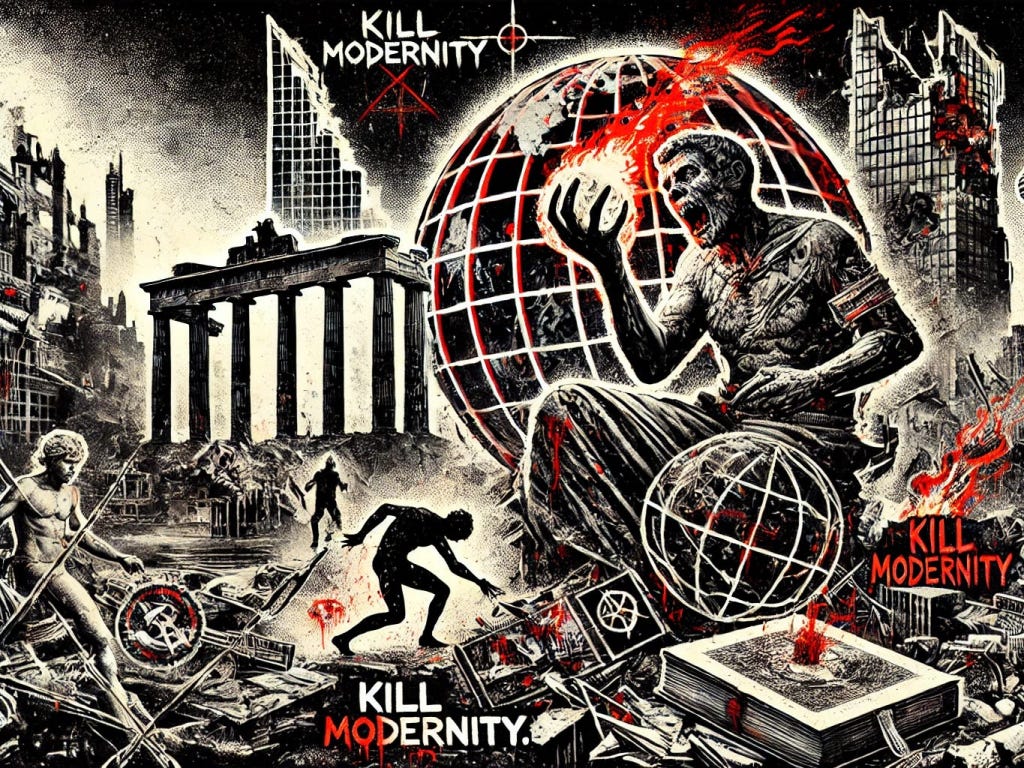Spenglerian Analysis by Constantin von Hoffmeister: "The West Lives in a Simulation While Russia is Shaping the Real World
The Ukraine conflict epitomizes the technocratic decline foreseen by Oswald Spengler, with Moscow embracing historical destiny while the machine-driven West crumbles under its own hubris
Constantin von Hoffmeister
Having produced several new translations of Oswald Spengler’s work, Mr. Hoffmeister is certainly well versed in his philosophy and historiographical ideas, which are part of a school of thought shared by a very notable few. Some will have heard of his Decline of the West, if they’ve heard of him at all. Mr. Hoffmeister is editor-in-chief of Arktos, which is an anti-globalist website, and has his own substack, Eurosiberia. The essay that follows includes some of those ideas and was published by RT here. It appears to be a reworked and shorter version of “Dugin and the Decline of the West” that was published at his substack. I’m pleased to note his substack is free.
The conflict in Ukraine is not about Ukraine. It is the West’s last delirious attempt to exert control over a world that no longer needs it. The West, lost in the labyrinth of its own technocratic nightmare, flails like a dying beast, mechanized and blind. The German historical philosopher Oswald Spengler (1880-1936), in ‘Man and Technics’ (1931), wrote of the Faustian civilization’s ultimate downfall, where technology, once an extension of organic culture, becomes an iron cage, trapping its creators in a world they no longer understand. The Western response to Ukraine is precisely this: Drones, sanctions, media narratives manufactured in real-time, an illusion of omnipotence maintained by algorithms, and artificial intelligence. But reality is slipping through the cracks. The more the West mechanizes, the more it loses its ability to perceive the living, breathing cultures it seeks to control.
A ceasefire? A negotiation? The West proposes them like a bureaucrat offering a new tax code, as if war were a spreadsheet that could be adjusted to fit quarterly projections. US President Donald Trump’s emissaries meet with Russian officials, not because they believe in peace but because the old America-–his America-–has sensed the shift. A world order of raw power is replacing the West’s dream of digital hegemony, and Russia, China, and a thousand-year-old history stand against it. Spengler saw it coming: The machines would overtake the soul, and the West would become incapable of organic thought. This is why they cannot understand Russia–-not because they lack intelligence, but because their intelligence has been reduced to an algorithmic process, stripped of cultural depth. The West is thinking in the way that a machine thinks, and Russia, still a creature of history, is thinking like an empire.
Russian President Vladimir Putin dismisses the ceasefire offer because he knows it is a mirage. He speaks of root causes, of history, of a world that is not reducible to transactions and diplomatic maneuvers. The West recoils in horror. This is the fundamental difference: Russia still understands what war means, while the West sees only an endless data stream of casualties, arms shipments, and strategic objectives. Spengler called this the tragic turn of Faustian civilization–-when man, having created his machines, no longer controls them. The West does not wage war for power or territory but to maintain the facade that it is still in control. War as process. War as algorithm. The end goal is never victory, only perpetual management of crises.
Meanwhile, the financial technocrats of the G7 conjure $50 billion from thin air, leveraging interest from Russia’s frozen assets, a sleight of hand that Spengler would recognize as the final stage of Western decay–-economic manipulation replacing genuine production, artificial wealth replacing true cultural strength. The West no longer builds. It merely extracts, redistributes, and sanctions, hoping that the machinery of global finance can replace the natural momentum of a rising civilization. Russia, in contrast, returns to the old ways: Industry, military strength, self-reliance. The difference is stark. One civilization grows more entangled in its own mechanical hat tricks, the other returns to the fundamental logic of history.
Spengler saw technology as both the great achievement and the final undoing of the West. It began as a tool, an extension of man’s will, but in the late stages, it turns against its creators, reducing them to mere components in a system that no longer serves them. The West’s obsession with sanctions, surveillance, and narrative control is not an expression of power. It is a sign of weakness. True imperial civilizations do not need to micro-manage the world; they shape it through sheer will. This is why Trump, despite his flaws, represents the only real possibility for a Western resurgence. He rejects the managerial ethos. He understands power instinctively, like the rulers of old. The new Conservative Revolution in America is not about ideology. It is about reclaiming agency from the machine.
And yet, the media apparatus, a monstrous organism birthed by technics, continues its relentless march, shaping reality through distortion. Spengler wrote that the press, in the late stages of Western civilization, ceases to inform and instead dictates what must be believed. Ukraine is reduced to a symbolic battlefield in this grand narrative. Russia is the villain because the system requires a villain. The truth is irrelevant. The headlines are written before the events occur. The war exists less as a physical struggle and more as a media spectacle, a grotesque ritual in which Western leaders play-act as warriors while ensuring they remain far from the consequences of their own actions.
But while the West is trapped in its simulation, Russia operates in the real. The battlefield is not a metaphor. It is a place where men kill and die. Spengler warned that the civilizations of the late stage would become incapable of true war–-they would engage in conflicts but only as technocratic exercises, devoid of the deep, existential struggle that defined the great wars of history. This is why the West cannot win in Ukraine. It fights as a bureaucratic entity, not as a people. And Russia, for all its flaws, fights as a people. The difference is everything.
So here we are, watching the end of an era. The West’s technics cannot save it. The more it relies on technology, the weaker it becomes. The West’s technocrats believe they are guiding history, but history is slipping from their grasp. Ukraine is just a chapter in a much larger story–-the story of the old world returning, of empire reclaiming its place over the managerial state. And Trump? He is not the solution, but he is a symptom. A sign that somewhere, buried beneath the layers of bureaucracy and digital wallpaper, the West still remembers what power looks like.
This war is not about Ukraine. It never was. It is about the final struggle between technics and history, between the machine and the soul. And in the end, the machine will fail. Spengler saw it. We see it now. And Russia, whatever else it may be, understands it better than the West ever will. [My Emphasis]
I don’t know, but it seems safe to bet that Orwell read Spengler as did Asimov and a few others like Huntington. I saw that Spengler was a student of Vico and both molded my conception of how history operates in both a cyclical and linear manner, some of that finding expression above. I must admit great disagreement with, “The new Conservative Revolution in America is not about ideology. It is about reclaiming agency from the machine.” Fortunately, Trump is declared to not be the solution. Musk is clearly the machine, the technics component of Team Trump. However, I would also say the technology can also be the undoing of the East as the West has no monopoly on making wrong choices. The condemnation of Neoliberalism is very well aimed along with the reduction of living to financial outcomes and little else. An interesting question is what does it mean to think/act like an empire as Russia is according to the author? I see it being very much a “managerial state” but working with a completely different aim than Western states: It’s all about supporting all the people and settling the vast regions of Russia that have lain vacant for so long. And then there’s the internal culture that makes Russians Russian which was shaped by external actors and Russians’s adaptations to their actions that were repetitive to a degree that lends powerful credence to the idea that history to some extent in circular.
I again find myself wanting to restudy Spengler and think I can do so by further investigating Mr. Hoffmeister’s substack. Those visiting the Arktos website and his substack will quickly see the promotion of Alexander Dugin’s work and that of other philosophers. I trust this stimulated readers’s brains and increased their curiosity.
*
*
*
Like what you’ve been reading at Karlof1’s Substack? Then please consider subscribing and choosing to make a monthly/yearly pledge to enable my efforts in this challenging realm. Thank You!






Thanks for this.
One thought struck me "...external actors and Russians’s adaptations to their actions that were repetitive to a degree that lends powerful credence to the idea that history to some extent in circular."
There is an occult idea that, rather than a circle, which implies a closed endlessly repeating loop, events can more usefully be thought of as a spiral wherein tensions pull against each other, providing impetus to a progressive equation - like a calculus which describes essentially the same constructs but with different, evolving outcomes on each successive iteration. For some reason, I suspect Mandelbrotian geometry is likely more apt, just based on my tiny understanding of fractals, but I couldn't possible expound on that idea.
This is really well put: “The machines would overtake the soul, and the West would become incapable of organic thought. This is why they cannot understand Russia–-not because they lack intelligence, but because their intelligence has been reduced to an algorithmic process, stripped of cultural depth.”